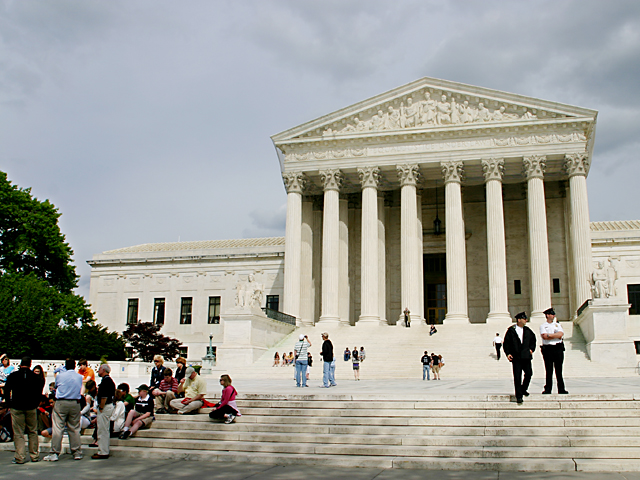The Progressive Farmer: High Court Rejects Animal Cases

The Supreme Court on Monday rejected hearing separate cases from Missouri, Indiana and 13 other states against livestock production standards set in California and Massachusetts that could restrict the food products sold in those states. (DTN file photo by Elaine Shein)
by Chris Clayton, DTN Ag Policy Editor | January 7, 2019
States Wanted Supreme Court to Rule on State Livestock Standard Laws
OMAHA (DTN) — The U.S. Supreme Court on Monday denied attempts to make oral arguments before the court by 15 states in lawsuits against California and Massachusetts over claims of regulating agricultural production across state lines.
Without commentary, the Supreme Court denied a pair of court cases, including Missouri and 12 other states versus California. The Supreme Court also denied a similar case led by Indiana and 12 other states against Massachusetts, though the court also noted that Justice Clarence Thomas would have granted the motion for a hearing.
The cases are similar, and most of the same states joined Missouri or Indiana in one or both cases. Missouri initiated a case against California’s law involving cage standards for egg-laying hens for those eggs to be sold in California. Massachusetts has a similar law blocking the sale of eggs, pork and veal in the state based on confinement standards, as well, prompting Indiana to lead a lawsuit.
Missouri and Indiana had each argued the cases should go directly to the Supreme Court as original jurisdiction. By letting the two laws stand, the high court essentially rejected the arguments by Missouri, Indiana and other states that the two related cases are “original actions” that should first be heard by the Supreme Court rather than go through circuit and appeals decisions first.
The Supreme Court had asked the Trump administration last summer to weigh in on whether the cases should be taken directly to the high court. In a brief filed in late November, the U.S. Solicitor General stated in separate briefs that the plaintiff states’ claims do not warrant the exercise of the Supreme Court’s original jurisdiction authority. The Solicitor General also stated in the California case that issues around economic impact of such regulations would be better decided in a case brought by someone who is being directly regulated by the California laws.
In the case against California, the state of Missouri is joined by Alabama, Arkansas, Indiana, Iowa, Louisiana, Nebraska, Nevada, North Dakota, Oklahoma, Texas, Utah and Wisconsin. Missouri argues that California’s law requiring larger cages for egg-laying hens increases the costs of eggs for consumers everywhere. Further, the suit alleges that California is violating the interstate piece of the Commerce Clause of the Constitution by imposing its own standards on eggs shipped into the state. Federal law also sets standards for eggs shipped and sold across the country.
In their case against Massachusetts, the state of Indiana is joined by Alabama, Arkansas, Louisiana, Missouri, Nebraska, North Dakota, Oklahoma, South Carolina, Texas, Utah, West Virginia and Wisconsin. The suit challenges Massachusetts’ “Prevention of Farm Animal Cruelty Act” that came from a state petition drive in 2016 and passed overwhelmingly by the state’s voters, 77.7% to 22.3%. The law prevents the sale of eggs, veal and pork product from an animal “that was confined in cruel manner.”
The states argue that, once the law goes into effect in 2022, it would create a significant financial burden for farmers in other states that sell into Massachusetts.
The cases were championed by national livestock groups affected by the state laws as well as advocacy organizations such as Protect the Harvest.
Over the past two cycles on the farm bill, Rep. Steve King, R-Iowa, has tried to pass provisions in the bill that would ban states from dictating animal welfare standards for farm products produced in other states. However, the provision has failed to make it into the final version of the farm bill. This past year, more than 100 House Democrats wrote a letter criticizing King’s provision, arguing it would wipe out protections nationally from communities and states.
The Humane Society of the United States on Monday praised the Supreme Court for the decision, as well as the Supreme Court rejecting another case that bans the sale of foie gras from force-fed birds.
Voters throughout the country have consistently shown that they support animal welfare standards for products sold within their states. And courts have long held that states have the right under the Constitution to establish similar criteria,” said Kitty Block, acting president and CEO of HSUS.
“But some factory farming corporations hate the progress we’ve made in this area, and have spent years prevaricating and delaying instead of making reforms,” Block said. “These companies have tried to overturn the right of states to set these standards both in Congress and the courts. Despite the factory farming industry’s massive financial resources and its army of lobbyists and lawyers, we’ve repeatedly prevailed.”